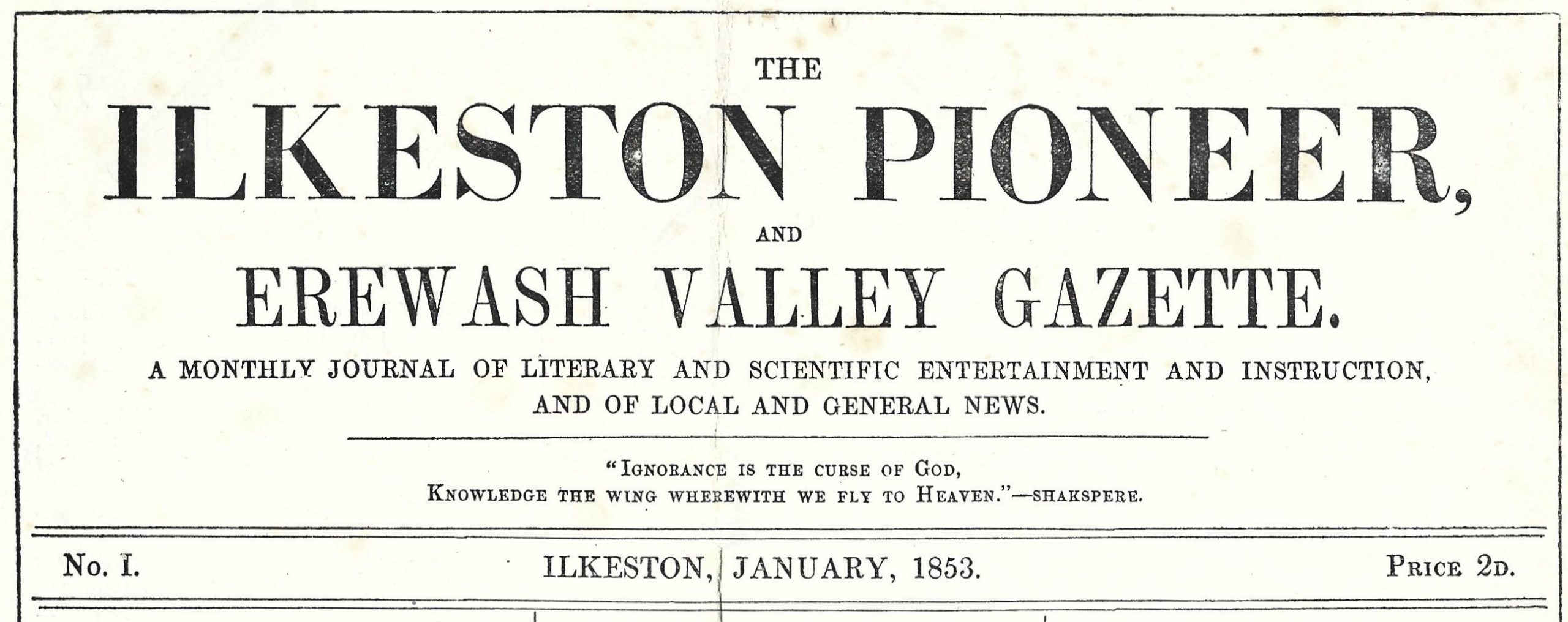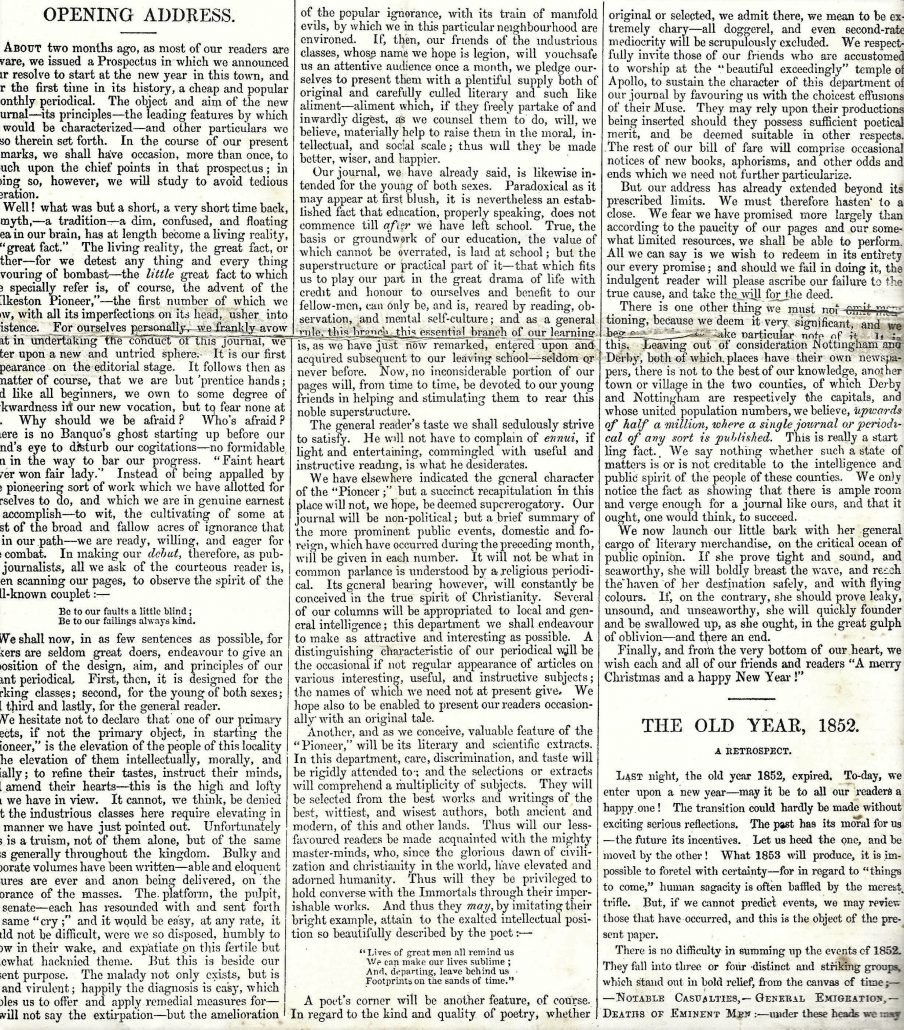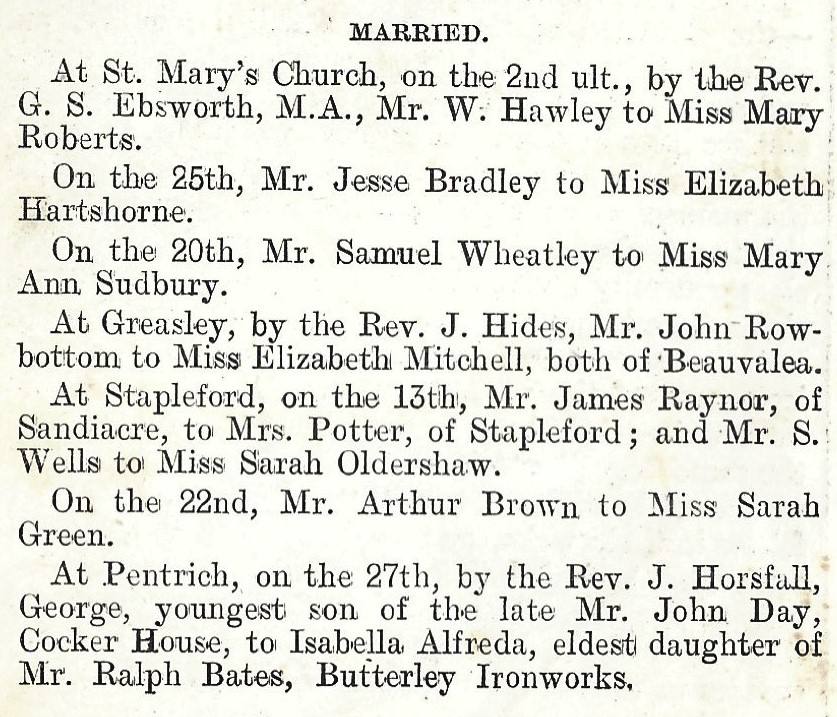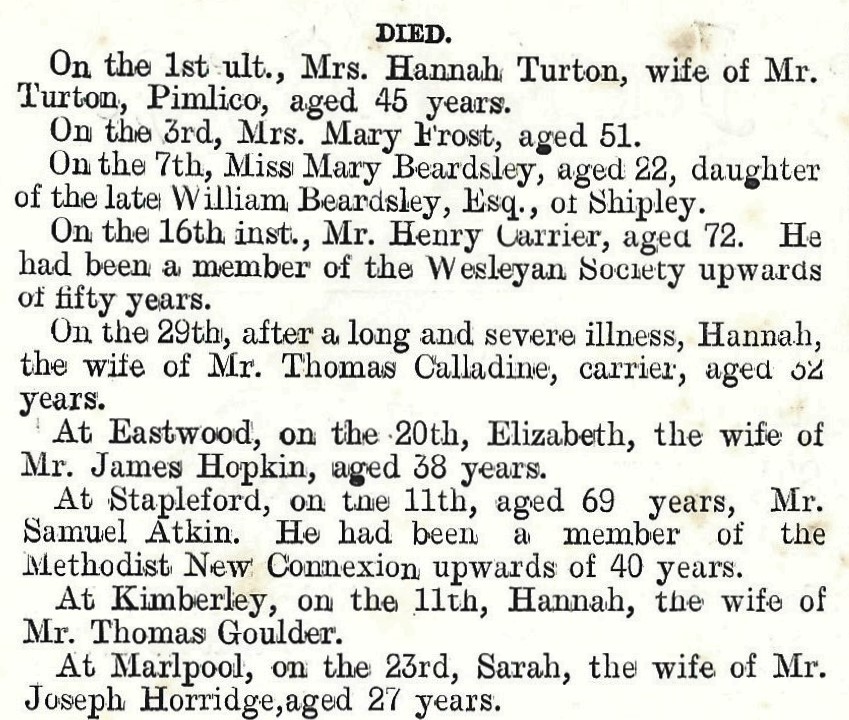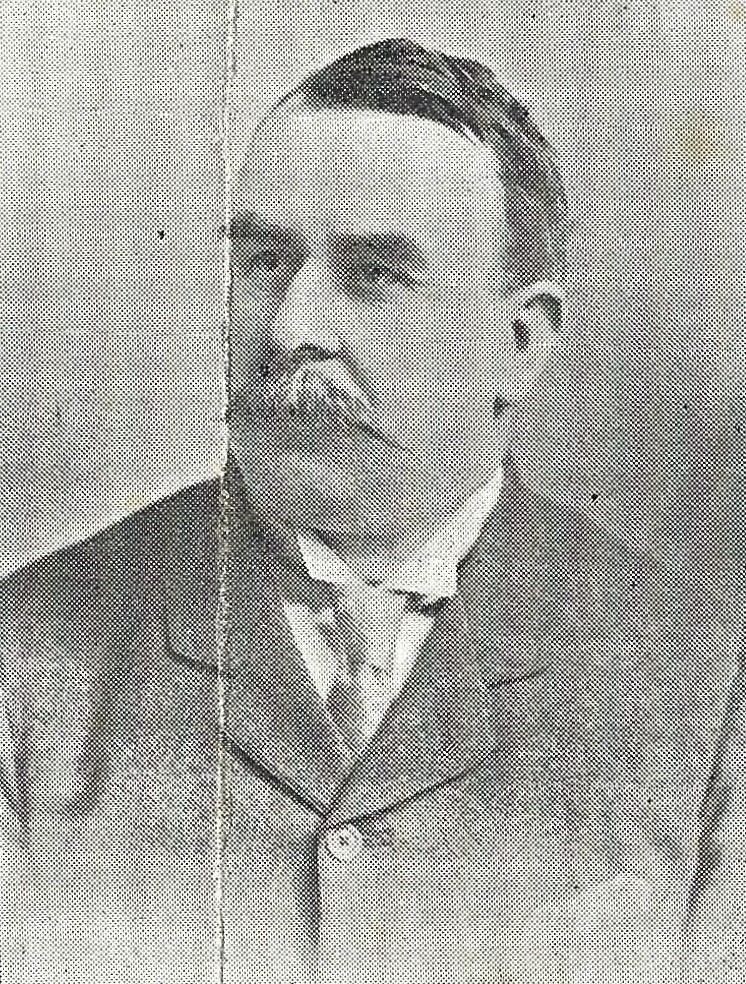A First Edition
Priced at 2d the first copy of the Ilkeston Pioneer and Erewash Valley Gazette was published on January 1st 1853 and consisted of eight pages. (The Derby Mercury and the Nottinghamshire Guardian were both then priced at 4½d).
—————————————————————————————————————————————————-
Page 1 was taken up almost exclusively by an ‘Opening Address’, written presumably by editor John Wombell, which referred to an earlier prospectus published about two months before, announcing the imminent arrival of this new periodical.
The journal’s target audience was ‘the working classes’, ‘the young of both sexes’ and ‘the general reader’.
Its primary aim was ‘the elevation of the people of this locality — the elevation of them intellectually, morally, and socially; to refine their tastes, instruct their minds, and amend their hearts..’ A monthly dose of the Pioneer would ameliorate the ignorance of the industrial masses, the members of which would thus be ‘made better, wiser, and happier’.
Having left school with a ‘basis of education’, young readers of the paper would be stimulated to build ‘a noble superstructure’ of further education, while the general reader’s taste would be sedulously satisfied by ‘light and entertaining, commingled with useful and instructive reading’.
The Address promised a non-political and non-religious Pioneer, with local and national news, literary and scientific extracts, a poet’s corner with contributions carefully selected — ‘all doggerel , and even second-rate mediocrity will be excluded’.
Its concluding remarks pointed out that –aside from Nottingham and Derby — there is not another town or village in the two counties (of Nottinghamshire and Derbyshire) which has its own periodical or journal.
And with that ‘the little bark with her general cargo of merchandise’ was launched on ‘the critical ocean of public opinion’.
There was just space on this page for the opening of an appreciation of ‘the old year 1852’, though most of it was left for the next page.
Just over a year later — in April 1854 — Venerable Whitehead, a contributor to this newspaper of several articles on the History of Ilkeston, wrote that he rejoiced in the the publication of the Pioneer ….
‘A well-conducted press — next to a true gospel ministry, is the most powerful means for improving a people. A press that prostitutes its high mission in order to pander to vicious tastes is the very reverse of a blessing’.
It could be argued that the Pioneer began as the former but changed into the latter.
If you wish to read this notable piece of Ilkeston’s history, here it is in its entirety. It is not easy reading (especially as I seem to have just about captured it all) and not the sort of article which a local newspaper of today would publish of course.
——————————————————————————————————————————————–
Page 2 continued the assessment of 1852 and was divided into…
- Notable casualties.
These included the fire on board the West India steam ship ‘Amazon’ (January) and its consequent sinking off the Scilly Islands, though with several inaccuracies in the description.
The Holmfirth flood disaster (February) when the Bilberry Reservoir burst its banks, sending a deadly mass of water down the Holme Valley, killing 81 people.
In November, an earthquake in western England (5.3 on the Richter Scale) and extensive flooding caused by heavy rains in many parts of the country.
On December 17th 1896 severe shocks were experienced over most parts of England and Wales. At that time John Cartwright also remembered one other quake in 1864, though didn’t mention this one of 1852. His mother (that would be Catherine Swanick) could recall one other in 1816.
- General emigration.
‘Every year England’s glory is extending — every year her children spread out, further and further’ … to the gold ‘diggings’ in Australia.
- Politics and Economics.
Although it again emphasised itself as a non-political journal (!!) the Pioneer recorded the main Government changes — the fall of Lord Russell’s Whig administration in February, the minority Tory Government of Lord Derby (the Who? Who? Ministry) which lasted until December, and was followed by the Peelite/Whig Coalition of Lord Aberdeen.
It also recorded that the country was enjoying commercial prosperity, food being abundant and cheap, and wages rising.
- Deaths of Eminent Men.
Mentioned were engraver William Finden and architect Augustus Welby Northmore Pugin, both of whom died in September….
and Massachusetts politician and Secretary of State Daniel Webster who died in October ‘like a great and good man’ ……
and Arthur Wellesley, Duke of Wellington, ‘England’s greatest general … the hero of a hundred fights’, including the Battle of Waterloo.
The page was finished off with an acrostic supplied by ‘A Resident’, the first letters of each line spelling out ‘The Ilkeston Pioneer and Erewash Valley Gazette’.
————————————————————————————————————————————————-
Page 3 contained ‘A Sketch’ or short story, called ‘The Mariner !’ by W S Shipley, followed by a poem — Love-lies-bleeding — by the same author. (William Samuel Shipley, born in Nottingham in 1832?)
It ended with a consideration of Love, ‘this tender, this divine passion’.
———————————————————————————————————————————————-
Page 4 was the first to include ‘local’ items and began with a section of ‘notices and correspondence’.
Ilkeston had been forewarned of the arrival of the Pioneer and some residents had taken the time to contact the newspaper.
One such was ‘Paul Pry’ who wrote to ask ….
‘Hoping I don’t intrude, I wish to know why Ilkestonians, as a general rule, pronounce the name of their town Il’sun instead of Ilkeston, as it is always spelt?’
Back came the reply.
‘We can only give an un hypothetical solution of our correspondent ‘Paul Pry’s’ query; — Perhaps it is to economise time or tongue — we use the word ‘tongue’ in the masculine sense only, — or both, that they pronounce Ilkeston with two syllables in lieu of three, which is the legitimate mode; or, perhaps it is to display their wit, — brevity being, as everyone knows, or ought to be, the very soul of wit’.
Brevity not being something that the reply suffered from.
Local news included …
A belated note that the Rev. G.S. Ebsworth, vicar of St. Mary’s Church, had given an eloquent and impressive sermon at the church on the occasion of the funeral of the Duke of Wellington (November 18th 1852) …. (it) was listened to with profound attention by a large and sympathizing audience’.
A report of a Parish meeting chaired by miller and churchwarden Henry Mantle Hitchcock, at the National schoolroom in December 1852 and at which the increased expenditure on the parish poor was a cause of concern. Also discussed were the formation of a Sanitary committee to inspect the town and report all nuisances, a complaint on the conduct of young men around the town, and the too numerous lodging houses in Ilkeston.
Political events, both at home and abroad were listed in a ‘Monthly Summary’ (of December 1852)
These included the dissolution of the Derby Ministry and the accession of the government of Lord Aberdeen, the end of the (Eighth) Kaffir War and of the Second Anglo-Burmese War, the rich and abundant pickings to be found in the gold mines of Australia, and the establishment in France of the Second Empire under Napoleon III.
Finally, there was a section listing district marriages and deaths ….
….the three December 1852 marriages at St. Mary’s Church..
On December 2nd, widower William Hawley and spinster Mary Roberts, who died five years later.
On December 25th, miner Jesse Bradley and Elizabeth Hartshorne, who died six years later, aged 24.
On December 26th, Cossall lacemaker Samuel Wheatley and Mary Ann Sudbury. Samuel died in tragic circumstances in January 1881.
… and several deaths ..
Hannah Turton (nee Cordon), aged 45, wife of Pimlico framework knitter John.
Mary Frost (nee Graham), aged 51, wife of labourer Thomas.
Henry Carrier, hosier, aged 72 (though registered as aged 73), ‘a member of the Wesleyan society upwards of 50 years’
Hannah Calladine (nee Henshaw), aged 32 (though registered as aged 33), wife of confectioner Thomas, ‘after a long and severe illness’.
The Pioneer attached dates to all these deaths although they were all burial dates.
The list also included …
Mary Beardsley, aged 22, daughter of William and Ann (nee Sills) of Shipley. This was in fact their daughter Ann who died on December 4th, aged 23.
There was a Mary Beardsley who also died on December 4th, aged 22, though she was not the daughter of William and Ann.
———————————————————————————————————————————————–
Page 5 continued the digest of local news.
News items mentioned here were ….
….. the possibility of a new street being built from the old Primitive Methodist Chapel at the end of Chapel Street to the premises of butcher William Rigley on Awsworth Road on the Common. This would take it northwards, along the line of the later North Street, from the end of Burr Lane to Cotmanhay and Awsworth Roads. And so it was of course later known as North Street leading on to North Road. This helps to date the establishment of those thoroughfares.
‘We think this will be a great convenience to the inhabitants generally, and of great pecuniary benefit to the land owners’.
…. the opening to public worship in December 1852 of the new Primitive Methodist Chapel in Bath Street.
…. a report on the Ilkeston Fair and Cattle Show.
William Riley of Bath Street won the best Fat Pig prize.
Afterwards ‘An excellent dinner was provided at Mr. Attenborough’s’ (The Sir John Warren)
…. the winter course of lectures of the Ilkeston Mechanics’ and Literary Institution.
Already in December of the previous year there had been sparsely-attended lectures on ‘the Buried Palaces of Ninevah’, ‘Self-made Men’, and ‘Reading and Readings’ (given by West-Hallam born Thomas Rossell Potter, F.R.S.L., now living in Wymeswold).
The Pioneer then made a plea to the Working men of Ilkeston…
“The Mechanics’ Institution was established for your benefit — The managers would, we feel assured, be delighted to find that their fellow townsmen were appreciating the aids to mental and moral improvement which the present course of popular lectures so richly affords. As your friends we would earnestly call upon you to patronize and lend your co-operation to these and all measures that tend to elevate the people”.
… the aftermath of a gale visited on Ilkeston on December 26th, when St. Mary’s church lost several glass windows and the gas works lost part of its roof, as did the new Primitive Methodist Chapel.
… the Christmas Supper, held at the Sir John Warren, of the ‘highly respectable and influential’ Duke of Rutland Odd Fellows Lodge, Manchester unity, after which there were ‘songs, sentiments and toasts’.
… a proposed strike by the employees of the Butterley Ironstone Works in pursuit of a wage increase — and motivated by the recent increase given to the coal workers of Samuel Potter’s Company and others in the district.
… a petition to Parliament from the Mechanics’ Institute at Ilkeston.
… several other stories from the Derbyshire district.
The page also contained —
— a reporting of cases at Smalley Petty Sessions (most of the them involving non-Ilkestonians).
— a Railway Time Table for January, of trains between Nottingham and Ilkeston and Mansfield … three trains each weekday and two on Sundays.
— the paper’s first ‘ad’, for Henry Thompson’s tailoring services in South Street.
— an exchange of letters between the Ilkeston Free-Trade Lodge of Odd Fellows and Richard Cobden M.P.
The former had its origins in a sick club which had met for over 50 years at the Old Harrow Inn in the Market Place but when its meeting place was moved to the Wine Vaults in East Street the members formed themselves into an Odd Fellow Society. They wrote to Richard Cobden, a founding member of the Anti-Corn Law League, seeking permission to use his name in their ‘re-christening’ of the lodge — ‘The Cobden Free Trade Lodge of Odd Fellows.
Richard’s reply was printed in full. He was flattered by the request but thought that as any future political decision which he made might not meet the approval of all the lodge’s members it would not be appropriate to link his name irrevocably with their organisation. Consequently “under these circumstances I would advise you to give in the adhesion of your lodge to a principle (free trade) which is eternal, but to avoid identifying yourselves with the name of a living and fallible politician”.
The page concluded with a passage on ‘Truth’ written by William Ellery Channing, and a couple of jokes which it is best to gloss over!!.
——————————————————————————————————————————————————-
Page 6 gave space over two columns to an address ‘to Working Men‘ by Edward Baines junior, then editor of the Leeds Mercury, ‘on the value of Education’ …. followed in column three by a letter from ‘JARL”, who, after much beating about the bush, got to the point of his correspondence — a proposal to establish a Savings Bank for the town.
The final item was an appreciation of ‘Uncle Tom’s Cabin’ by Harriet Beecher Stowe (published in 1852), exhorting Pioneer readers to go out at once and buy her ‘powerful, eloquent, and pathetic pleadings in behalf of the poor down-trodden slave’.
———————————————————————————————————————————————
Page 7 featured a letter from India — the first of four — written three years before by ‘a planter in search of coolies’ (the writer being otherwise anonymous but an old class-mate, known to the editor).
This first letter described the journey, south to north, along the central spine of Ceylon, from Matele to Anaradhapoora.
There was then a short section of ‘Odds and Ends’ at the end of the page, including a list of ‘Marriages of Eminent People’.
First on the list were Adam and Eve who ‘married before a year old’, while last on the same list was ‘Old Parr’ who married his last wife at the alleged age of 120.
————————————————————————————————————————————————————
Page 8, the final one, was given over to advertising.
Showcasing their wares were ….
Thomas Hives of the Rutland Arms and Railway Hotel, and Ilkeston Baths. (N.B. … Horse and Fly on reasonable terms).
John Wilmot, ‘the People’s obedient Servant’, announcing a new coach connecting Ilkeston and Nottingham, — more precisely linking the King’s Head Inn in the Market place with the Black Boy Posting House in Long Row — travelling five days a week.
John Ross, auctioneer of Bath Street, announcing the sale of a tree-acre field of building land in the White Lion area, owned by farmer John Taylor of Ilkeston Hall Farm.
Thomas Merry, grocer, chemist, druggist and ironmonger of the Market Place.
William Rose, boot maker of Bath Street.
Eleanor (Ellen) Padman and her girls’ school in Bath Street … ‘terms and references forwarded on application’.
William Marshall, baker, confectioner and dealer in British Wines, then trading in the Market Place.
… and John Wombell, printer, publisher and stationer, of Bath Street .. who was in immediate want of an out-door apprentice.
———————————————————————————————————————————————–
Stop Press.
In September 1854 the Pioneer ceased production. It was then into its second year (Volume 2) and had just printed newspaper number 38 (September 21st 1854).
Proprietor of the Pioneer John Wombell had married Susannah Gover on June 9th 1838 at St. James’s Church, Great Grimsby.
Their first child born in Ilkeston was daughter Susannah Mary (1843), followed by Emma Gover (1844), John Garland (1849) and William Woodward (1852).
In October 1853, 22-year-old Maria Beardsley, daughter of stone miner Mark and Sarah (nee Trueman) gave birth to her illegitimate son George Wake Beardsley. The child was baptised at St.Mary’s Church on February 7th 1855.
Evidence suggests that the father of the child was John Wombell of the Pioneer. (see previous section)
The Pioneer reappeared in April 1856, then into Volume 3 (sic), printing number 42.
Presumably at some time between September 1854 and April 1856, numbers 39, 40 and 41 had been published…. though if they did exist they appear to have been lost.
In December 1857 Susannah Wombell gave birth to her final child, an unnamed daughter who died the same day.
Could the Wombell’s domestic situation have influenced the Pioneer’s printing schedule?!
——————————————————————————————————————————————————
After Wombell
In 1887 the newspaper passed into the hands of Cornelius Brown of Newark and in 1891 was transferred to the Ilkeston Pioneer Printing Co. Ltd.
In 1892 its editor was Edwin Trueman, (connected with the paper since 1862), and ten years later he became sole proprietor.
In 1915 the Pioneer Printing Co. Ltd. once more assumed ownership.
Edwin continued as editor until his death on May 8th, 1923.
He was succeeded by his eldest son, Alfred Job Trueman.
———————————————————————————————————————————————————-
Out of print.
The little bark which had been launched upon the critical ocean of public opinion on January 1st 1853 found its final mooring on March 23rd 1967.
On that date, number 2632 of the Pioneer (16 pages for 3d) announced on its front page ….
“This is the last issue of the Ilkeston Pioneer. The decision to suspend publication has been taken after prolonged consideration and with the greatest regret. For several years the costs of producing the newspaper have been rising steadily without a corresponding increase in revenue. In recent months the position has been made more acute and there are no grounds for anticipating any considerable additional revenue in the future.
“Alternative employment has been offered to all employees of the Pioneer and arrangements have been made to provide an improved service of local news to the people of Ilkeston and district through the Evening Post and News and Guardian Journal each day. The Pioneer office in Bath-street will become a branch office of T. Bailey Forman Limited, where the Evening Post and News, Guardian Journal, Nottinghamshire Guardian and Football Post and News will be on sale and where advertisements for all these newspapers will be accepted”.
And thus the newspaper which had seen off many rivals in the past was forced to surrender to adverse financial forces.
Once more the town was left with only one local Ilkeston paper.
——————————————————————————————————————————————————
And now on to George Small.

